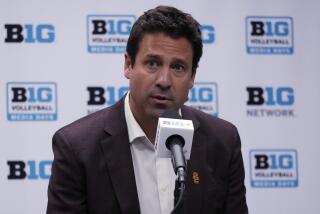Pac-10 Votes to Reinstate Tournament
- Share via
As expected, Pacific 10 Conference presidents voted Monday to reinstate the men’s postseason basketball tournament, beginning in March 2002 at Staples Center.
UCLA, which had been one of three Pac-10 schools opposing the tournament, was the swing school in a measure that required eight votes for approval.
The final tally was 8-2, with Arizona and Stanford voting against the proposal.
By a 9-1 vote, the conference’s chief executive officers approved a women’s tournament, the first, to begin in 2002 at a Pac-10 campus to be determined.
The presidents also approved a year-round training table for athletes in all sports, a victory in particular for conference football coaches who have complained the lack of a year-round nutrition program has hurt in recruiting.
The decision to reinstate the men’s tournament after a decade’s absence became all but a forgone conclusion after university athletic directors approved the measure last summer.
“I think it’s a positive for the obvious reasons,” UCLA Coach Steve Lavin said of the vote, “just for the national attention and spotlight that will be brought to the Pac-10 and West Coast basketball in general.”
Monday’s decision did not sit well with the two coaches who opposed the tournament.
“I’m disappointed,” Stanford Coach Mike Montgomery said. “There’s just a lot of things I have trouble with. Obviously, at this point, it doesn’t do myself any good to concern myself with those things . . . we’ll make adjustments, we’ll change our schedule and we’ll show up and try to do the best we can.”
Voting as a bloc, UCLA, Stanford and Arizona had for years opposed the tournament for academic reasons.
“Our objection has always been the loss of additional class time at a key time in the semester,” Arizona Coach Lute Olson offered Monday in a released statement.
UCLA’s academic concerns, however, were alleviated with the decision to hold the annual tournament at Staples and the agreement to shorten the event to a Thursday-through-Saturday format involving only the conference’s top eight teams.
But there were also financial considerations. UCLA argued it could make more money-- $150,000 to $250,000--by scheduling an additional nonconference home game than it could by playing in a postseason tournament. The last Pac-10 tournament, which ended after a four-year run in 1990, netted each school less than $100,000 annually.
Under the terms of the new Fox deal, however, each member school could reap as much as $300,000 a year.
Is it all about the money?
“Absolutely,” Montgomery said. “I wonder how much of this money gets back to the basketball players that are playing in this tournament.”
Montgomery said he was disappointed that UCLA had changed its position.
“I can’t speak for [UCLA Athletic Director] Peter Dalis,” Montgomery said. “I don’t know what his thinking is, but they have steadfastly been against it for academic reasons when they were forced to travel.”
Montgomery thinks Dalis was pressured into changing his position by the city of Los Angeles, Fox and Staples Center.
“He may philosophically have opposition to this even now but I don’t think he could say that or do that, given the set of circumstances,” Montgomery said of Dalis. “You’d have to ask him, if this thing were in Seattle every year would he be in favor of going?”
UCLA spokesman Marc Dellins said Dalis was in meetings all day and would be unavailable for comment.
The Pac 10’s decision leaves the Ivy League as the only major college conference without a postseason tournament.
The Pac-10 has for years argued that the lack of a tournament has cost it national exposure in the week preceding NCAA selection Sunday.
“It’s kind of like we drop off the face of the earth,” associate Commissioner Jim Muldoon said Monday.
No one can say for sure how the tournament will impact the number of NCAA bids the conference may receive. However, only the winner of the tournament will receive an automatic bid. The risk of playing a tournament is that a school can play its way into or out of an NCAA bid.
Montgomery thinks the tournament may further diminish a regular season that has already become diluted, but Lavin says a tournament will give hope to Pac-10 schools that have no hope of otherwise getting an NCAA bid.
“Instead of playing the spoiler down the stretch, teams can play good basketball with a sense of purpose,” Lavin said. “Now it gives every team a fighting chance.”
Last season, without a tournament, Arizona and Stanford received No. 1 seedings in the NCAA tournament.
“I think it takes a little bit away from the 18 games,” Montgomery said of the regular season. “I know how special it’s been for us the last two years to get to the last game of the year and having to win to play for a conference championship.”
More to Read
Go beyond the scoreboard
Get the latest on L.A.'s teams in the daily Sports Report newsletter.
You may occasionally receive promotional content from the Los Angeles Times.







